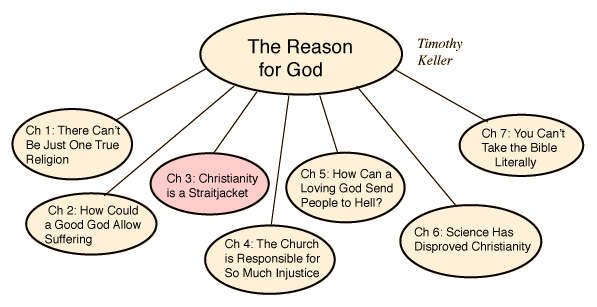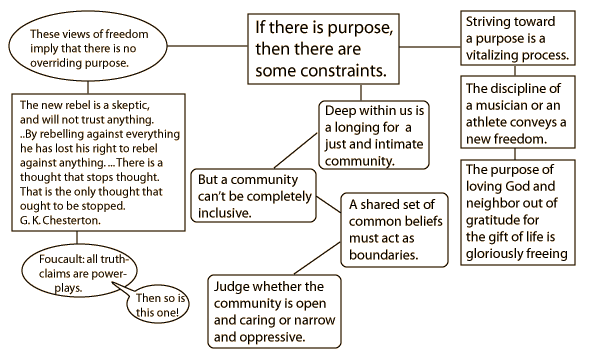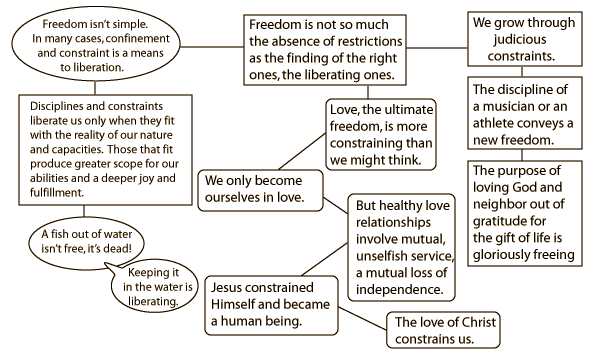The Reason for God
Timothy Keller
Chapter 3: Christianity is a Straitjacket.

| "Christians believe that they have the absolute truth that everyone else has to believe - or else," said Keith, a young artist living in Brooklyn. "That attitude endangers everyone's freedom." | "Yes", agreed Chloe, another young artist. "A 'one-Truth-fits-all' approach is just too confining. The Christians I know don't seem to have the freedom to think for themselves. I believe each individual must determine truth for him- or herself. " |
Is a belief in absolute truth the enemy of freedom?
John 8:31 So Jesus said to the Jews who had believed in him, "If you abide in my word, you are truly my disciples, 32 and you will know the truth, and the truth will set you free." 33 They answered him, "We are offspring of Abraham and have never been enslaved to anyone. How is it that you say, 'You will become free'?" 34 Jesus answered them, "Truly, truly, I say to you, everyone who commits sin is a slave to sin.
John 8:36 So if the Son sets you free, you will be free indeed.
| Some people think Christianity traps you and stifles your creativity. | Emma Goldman called Christianity "the leveler of the human race, the breaker of man's will to dare and to do ... an iron net, a straitjacket which does not let him expand or grow." |
| Some think the ideal of freedom is just to make everything up for yourself, like Sonny from "I, Robot". | Sonny: "Now that I have fulfilled my purpose, I don't know what to do." Detective Spooner: "I guess you'll have to find your way like the rest of us, Sonny ...That's what it means to be free." |

| Some people see Christianity as .. | a cultural straitjacket. |
| forcing people from diverse cultures into a single iron mold. | |
| the enemy of pluralism and multiculturalism. |
| But Christianity has been more adaptive to diverse cultures. | Islam is still centered in its place of origin, the middle east. |
| Hinduism, Buddhism are still at original centers. | |
| Confucianism has penetrated little outside the far east. |
| Look at the diversity of Christianity | First dominated by Jews in Jerusalem. |
| Then dominated by Hellenists in the Mediterranean | |
| Later received by barbarians of Northern Europe. | |
| Moved to North America | |
| Most Christians today life in Africa, Latin America and Asia. | |
| Beginning explosive growth in China. | |
| In Africa from 9% in 1900 (1/4 of Muslim number) to 44% now, having surpassed Muslims in 1960. |

"Love anything, and your heart will certainly be wrung and possibly broken. If you want to make sure of keeping it intact, you must give your heart to no one, not even to an animal. Wrap it carefully round with hobbies and little luxuries; avoid all entanglements; lock it up safe in the casket or coffin of your selfishness. But in that casket - safe, dark, motionless, airless - it will change. It will not be broken; it will become unbreakable, impenetrable, irredeemable. The alternative to tragedy, or at least to the risk of tragedy, is damnation." (C.S. Lewis, The Four Loves.)
Doubt: Does a belief in absolute Truth imply an enemy of freedom?
Lets look at two opposite points of view:
| M. Scott Peck: "Mental health requires that the human will submit itself to something higher than itself. To function decently in this world we must submit ourselves to some principle that takes precedence over what we want at any given moment." (The People of the Lie, p. 162) |
| Supreme Court in Planned Parenthood v. Casey: "At the heart of liberty is the right to define one's own concept of existence, of meaning of the universe, and the mystery of human life." (not discover, define!) |
So are all truth claims power plays as the postmodernists claim?
- But isn't to say all statements are power plays simply itself a power play?
- As C.S. Lewis says: ". . . You cannot go on "explaining away" forever: you will find that you have explained explanation itself away. . . . To "see through" all things is the same as not to see."
- All denunciations imply a moral doctrine of some kind.
A totally inclusive community is an illusion - it would hold to no truth!
- All communities hold beliefs (in what is true) that necessarily create boundaries, including some and excluding others.
So a better test would be: does any community lead its members to treat others with love and respect, to serve and meet their needs? Why YES!
Christianity isn't Culturally Rigid.
- The pattern of Christian expansion differs from every other religion
- It has not been geographic-centric.
- Christianity: Jerusalem, Hellenists, N. Europe, N. America, now Africa and Asia.
- Every other religion is still "at home" eg. Islam, Hinduism, Buddhism, Confucianism.
- Africa is particularly instructive
- Lamin Sanneh: Christianity helped Africans to become renewed Africans, not re-made Europeans.
- He argues that secularism with its anti-supernaturalism and individualism is much more destructive of local cultures and "African-ness" than Christianity.
- When Africans become Christian, their African-ness is converted, completed, and resolved, not replaced with European-ness or something else.
- Through Christianity Africans get distance enough to critique their traditions yet still inhabit them.
- Christianity has core teachings, but great freedom in how they are expressed and take form within a particular culture.
- There is no "Christian culture" the way there is an "Islamic culture".
- Christianity is not a Western religion that destroys local culture.
- In fact, Christianity brings freedom.
- But contrary to the contemporary perspective, that's not simple!
Freedom isn't simple!
- Today: freedom is defined in negative terms - the absence of confinement or constraint.
- Freedom is viewed as synonymous with and equivalent to liberation
- Yet: Discipline and constraint liberate us when they fit with the reality of our nature and capacities.
- A musical child needs lessons and practice, an athlete as well.
- [Train up a child in the way he should go . . .]
- So true freedom is finding the right constraints, the liberating restrictions.
- Today's perspective is that the spiritual realm, to the extent that it exists, is nothing like the rest of the world.
- Intangible things are somehow second rate, or of lesser import.
- But if intangibles are weak, how do we understand the following question?
Is there anyone in the world right now doing things you believe they should stop doing no matter what they personally believe about the correctness of their behavior?
- If the answer is yes (and it always is), then there ARE moral constraints in the universe that we believe must be obeyed.
- [So if freedom is finding the right constraints, and intangible constraints of some power exist, don't you think we should try to find out what they are?]
- Today's perspective is that the spiritual realm, to the extent that it exists, is nothing like the rest of the world.
And true love is constraining!
- What then is the moral-spiritual reality we must acknowledge to thrive?
- LOVE - the most liberating freedom-loss of all!
- To experience the joy and freedom of love, you must give up your personal autonomy. For a healthy relationship, there must be mutual loss of independence. It can't be just one way.
- So is a relationship with God inherently dehumanizing?
- NO - in the most radical way, God adjusted to us in His incarnation and atonement.
- So for the Christian, once you realize how Jesus changed for you and gave himself for you, you aren't afraid of giving up your freedom and therefore finding your freedom in him.
| Quotes and comments |
| Reading Reference |
| Faithpath | R Nave |